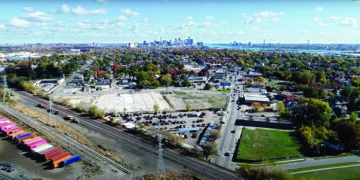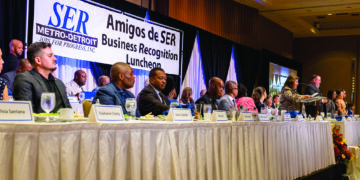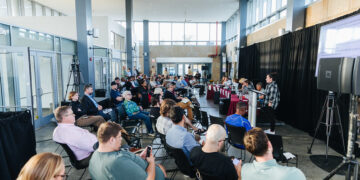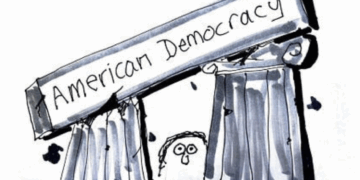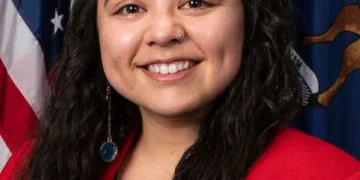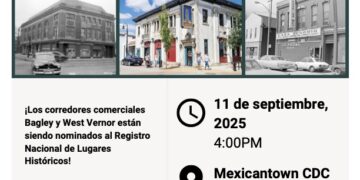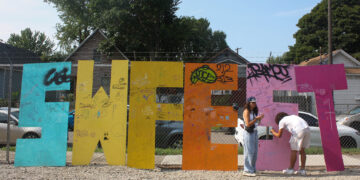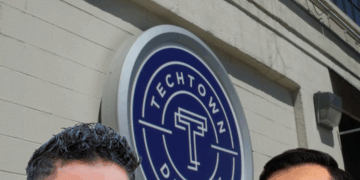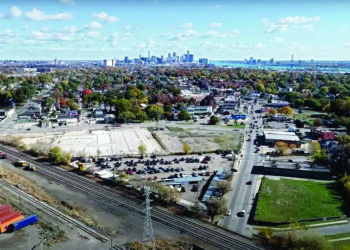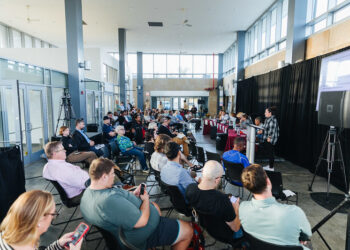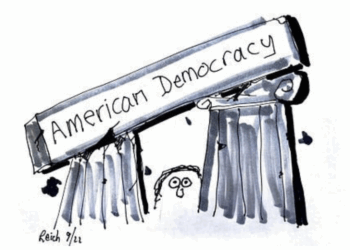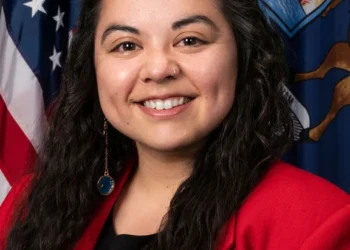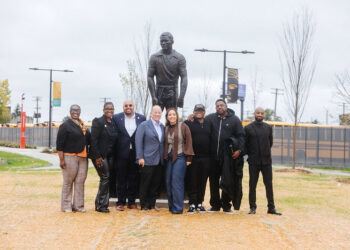The following interview was conducted by EL CENTRAL Hispanic News freelance writer Estefania Arellano-Bermudez who is a regular contributor to EL CENTRAL and Planet Detroit. Council President Mary Sheffield is on the ballot for Detroit’s Mayoral election on August 5 and her campaign reached out to EL CENTRAL to make her available to address issues of concern to our readers and followers. This Q&A features questions about air pollution, infrastructure, immigration, the watermain break, housing, and language access.
EL CENTRAL: I just wanted to thank you for taking time to meet with me this morning. I know that your schedule right now is kind of hectic. The first question is about air pollution. For Southwest Detroit residents living near the heavy truck traffic in industrial corridors, there are elevated rates of asthma, cancer risk, and other health problems due to poor air quality. As mayor, what concrete steps would you take to reduce industrial pollution, improve public health outcomes and hold polluters accountable?
Council President Mary Sheffield: We’re going to continue to uplift all of the work that the environmental justice advocates are pushing forward with the risk policies and procedures that we can implement. Currently, there is a truck traffic ordinance that is being proposed by one of my colleagues that I’m looking forward to supporting. We just recently approved a fugitive dust ordinance, and so we will continue to put in the appropriate policies and laws in place that prevent any environmental injustices from taking place, hold industry accountable, and ensure that the community has a voice throughout that process.
We’re going to also ensure that we’re doing as much community engagement so that we do not bring heavy industry into the budding neighborhoods where residents actually stay. I think that’s important, as well, so that we don’t have conflicts (when) we look up and we have a salt mining company or a polluting industry that is adjacent to neighbors and residents, and so we’re going to be “down zoning” as much as possible and also ensuring that we’re not bringing those uses heavy industrial uses into residential communities.
I think it’s important that we bring industry, the health department community and environmental justice advocates all to the table to figure out what are the next best steps and what more we can be doing to ensure clean air and water here in the city of Detroit. We’ll also be working with the Office of Sustainability to continue to push out more measures and policies and procedures that we can put in place to ensure the safety of our residents. So (that’s a) very important issue and one in which I’m going to continue to elevate the work that is being done on the ground, but also bringing in experts to guide us on what more we can put in place to ensure that industry is held accountable, that the health department is at the table, and that residents are protected.
EL CENTRAL: Southwest Detroit has crumbling sidewalks, uneven roads, poor drainage and bad street lighting in some places. How will you ensure that these neighborhoods get their fair share of investment infrastructure so that not only downtown or more visible corridors are positively affected by investments?
Council President Mary Sheffield: One, everyone throughout the city, no matter where you live, should have an increased quality of life, and it shouldn’t just be concentrated in downtown and midtown. And so we all know that neighborhoods have to be a central focus of this next administration ensuring that more infrastructure, more investment, more development is taking place in our neighborhoods, in our communities, and Southwest Detroit would definitely be front and center of those conversations, and so we’re going to continue to seek out federal funding. I know things have changed a lot on the federal level, but a lot of our infrastructure money does come for the federal government, so we’ll still aggressively pursue that as well as the state of Michigan, additional grants and using our existing general fund dollars to ensure that we’re investing as much in our infrastructure as possible.
I’m also going to be exploring alternative revenue streams that can come to Detroit that can fund infrastructure in transit and other issues that we have in Detroit. We’re studying Columbus, Ohio. They have a half penny sales tax that was applied that has generated over $200 million for their city, and they’ve used it specifically for infrastructure. And so we have various ways and I think that we can explore how we bring more money in to address infrastructure needs, whether it’s now securing additional bonds because we have good credit ratings, we have to explore all of our options to ensure that we have appropriate funding to address infrastructure. But I do believe in equity, I believe in inclusion, and I believe that all of our neighbors and residents throughout the city should feel the infrastructure improvements, not just in greater downtown and Midtown.
EL CENTRAL: With the ICE raids sweeping across the undocumented community, what is your stance on mandated cooperation between Detroit police and federal immigration enforcement?
Council President Mary Sheffield: I don’t believe in any cooperation between our city resources and that is our staff, our funding, and our DPD working with federal immigration efforts. That is something that I vehemently oppose. DPD’s sole job is to bring law and order in their capacity to make our city safe and that’s what they will be doing, not assisting in any efforts with federal immigration. I will continue to ensure that we are empowering our immigrant communities with resources, with information so that they feel safe and protected. We have an office of immigrant affairs that I think can be more staffed and more funded to ensure that they have the proper resources to do outreach, to provide language access, and to ensure that our immigrant communities feel the safety and protection that they need.
I was instrumental in also approving the Detroit ID program with our former council member Castañeda-Lopez, and very proud of that program and any way that I can be a part of providing paths to citizenship and providing protection and safety for all of our immigrant communities, that is what I’ll do. So we will not be collaborating. We’ll be very bold in our approach, and that is where I stand.
EL CENTRAL: So this question is about the watermain break. Southwest Detroit residents were left without water or under boil advisories for days and weeks following the recent watermain break. Many say they got no warning from the city. How will you ensure that our aging water infrastructure is fixed and that communities like Southwest aren’t left behind during emergencies?
Council President Mary Sheffield: This goes back to what I mentioned before. I mean, without a doubt, we have some of the oldest aging infrastructure throughout the country in Detroit, and when it comes to water and floods and basement backups, we are overburdened with the amount of residents who deal with this unfortunate situation. I think the watermain break again just showed us the need to continue to invest in our infrastructure and that is something that we will continue. I will continue to ensure that we prioritize that we’re spending appropriate dollars to invest in our infrastructure, and as I mentioned earlier, not just in downtown or midtown, but this has to happen throughout our neighborhoods because our residents in these communities are often the ones who have to bear the most, especially when it rains or storms or if a watermain breaks, it’s our residents that are completely hurt and have to deal with a very unfortunate circumstance. So we will ensure that there is proper communication. I know oftentimes when these crises take place, residents are sometimes not properly notified from the city. They don’t know exactly how to respond or what to do, so we want to make sure in the case of crisis or a watermain break that there’s proper communication and outreach from the city from all angles to ensure that people know what to do, what resources are available, and that we’re able to immediately respond to the crisis, as well.
EL CENTRAL: In Southwest Detroit, rising rents and housing instability are hitting working class families hard. Many are renters with little protection. How will you stop displacement, hold landlords accountable and make sure affordable housing stays within reach for the people who call Southwest home?
Council President Mary Sheffield: I am very proud of my record around tenant rights and ensuring that our tenants are protected. I created the city’s first ever right to counsel ordinance, which provides a free attorney for any family that is facing eviction. And because of that, we’ve kept 4,000 families in their home to date. And so under my administration, we will continue that program, but we will fully fund it so that anyone that calls and is on the brink of eviction will have access to an attorney so that they’re not going through a legal eviction without an attorney. Secondly, we’re going to ensure that we have hopefully more rent control laws in place. I know right now the state law prevents us from having rent control, but I will be a mayor that advocates that we have some control and flexibility over how rents can be charged in Detroit so that people are not taking advantage of our tenants and our residents.
We’re also going to have an office of housing rights and home ownership, which will provide the empowerment and the support to our existing tenants to know their rights as tenants, to know how to deal with landlords and to also transition, as much as we can, renters into homeowners. And then lastly, we need more eviction diversion programs in place, and so we are going to aggressively put more money into prevention that allows for the city to intervene if there’s landlord-tenant disputes, if we see a tenant that is on the brink of eviction and needs help with rental assistance and really provide the wraparound services before we get to a place of someone possibly losing their unit or becoming homeless. And so we’re going to tackle it from those two perspectives, really honing in on prevention.
And then we’re also going to work to continue to reduce property taxes in Detroit, which oftentimes is one of the reasons why landlords do raise rents is because the cost of living here, the cost of doing development here can be high, and so they pass that cost on to the tenants. So we’re going to keep working on also reducing property taxes in Detroit and empowering tenants with as much information and empowerment that they need to understand how to deal with the landlords, as well.
And we’re going to build more affordable housing, by the way. That’s another important thing. We’ve got to keep building more housing that is available for residents and housing that is strictly set aside for affordability of low income housing so that we cannot get into a situation where it’s being raised. It will be restrictive housing that has to be mandated to be set aside at a certain AMI (Average Median Income) level.
EL CENTRAL: I noticed earlier you said something about creating city signage and everything in different languages. Would you commit to making city signage accessible to Spanish speakers and Arabic speakers?
Council President Mary Sheffield: I think language access is very important and we recently passed a language access ordinance sponsored by Councilmember Santiago-Romero, and I would do all that I can to fully implement that ordinance. And really, language access should be embedded in every single function of city government, from every department to every televised thing that we do, to everything that’s video, to every, I mean every component of city government. If there is a possibility to have language access in multiple languages for those who speak multiple languages, to be able to receive that information, we should honor that and do that.
EL CENTRAL: Okay. Thank you. I really appreciate you, council president, for taking time to speak with me.
Estefania Arellano-Bermudez is a Latina freelance writer living in metro Detroit. She is a regular contributor to EL CENTRAL Hispanic News and a member of Planet Detroit’s Neighborhood Reporting Lab.
This article and photos were made possible thanks to a generous grant to EL CENTRAL Hispanic News by Press Forward, the national movement to strengthen communities by reinvigorating local news. Learn more at www.pressforward.news.

